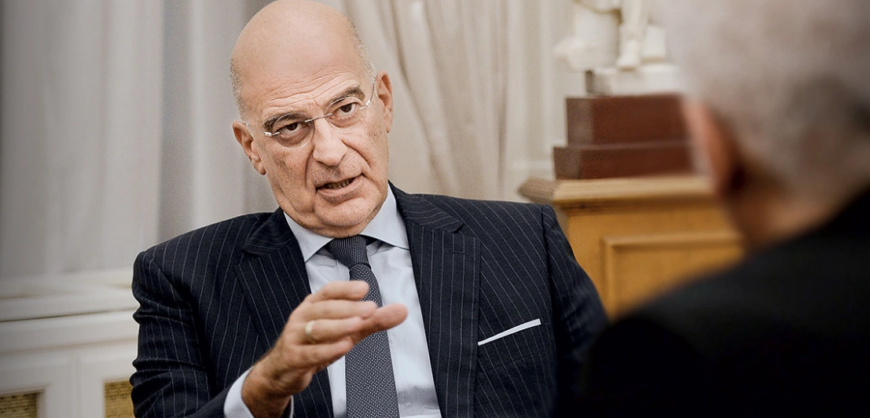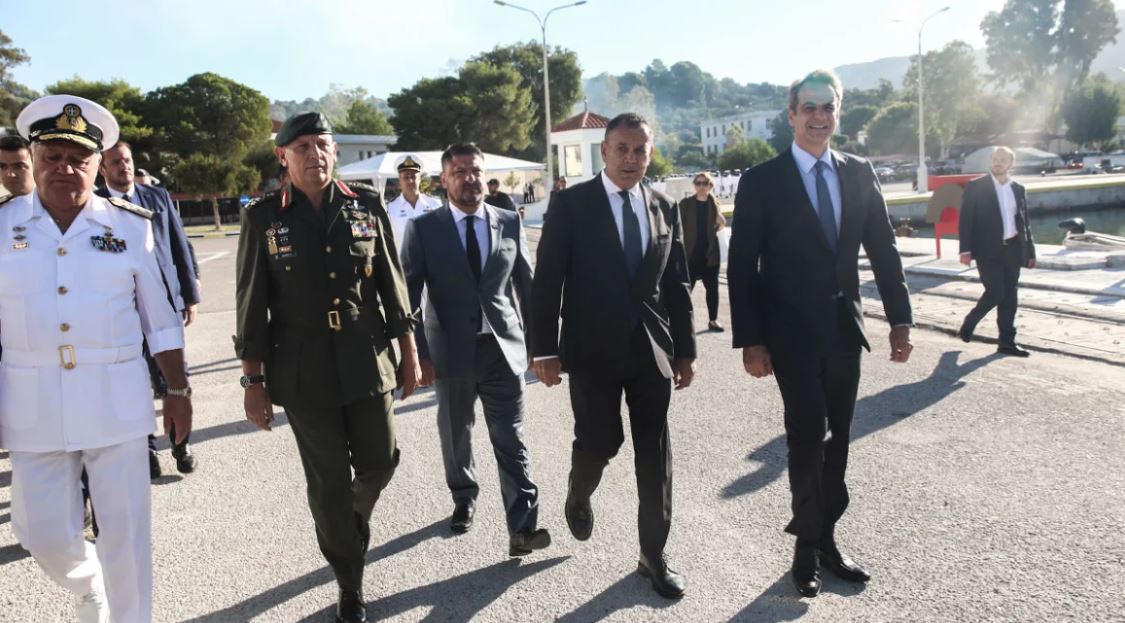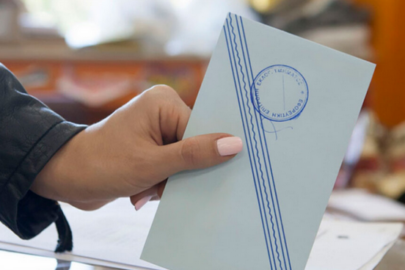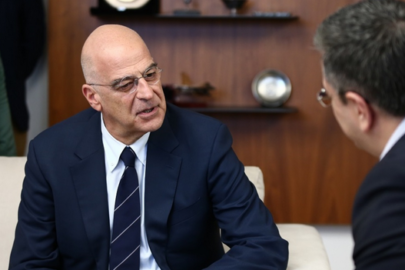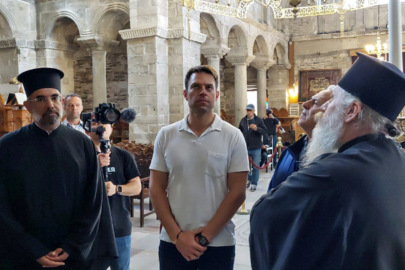Greece has chosen not to follow Turkey in this outrageous and dangerous downward spiral of aggressive rhetoric, Foreign Minister Nikos Dendias points out in an exclusive interview with Proto Thema at a time when Recep Tayyip Erdogan appears to be out of control.
“I would not like to speculate or estimate whether these moves are part of an overall plan by the Turkish leadership that could lead to uncontrollable situations”, Mr. Dendias answers the question of whether the sequence of events will end in a crisis. For his part, the Minister of Foreign Affairs assures: “We will do everything necessary to defend our homeland”, stressing with emphasis: “We are ready for all eventualities”.
On the question of how the tension could be de-escalated, Mr. Dendias reveals that Athens is looking for ways “for Turkey to get out of the self-fueled and self-entrapped policy in order to create the minimum conditions for the resumption of dialogue or at least some contacts”, while adding: “We are ready and willing for a constructive and meaningful dialogue with Turkey.”
Sending a clear message to the opposite side of the Aegean, the head of Greek diplomacy notes that borders cannot be redrawn by force. Of particular interest are Mr. Dendia’s answers to questions about US-Turkish relations, the F-16s and F-35s, the restoration of Turkey’s relations with Israel, Saudi Arabia and the United Arab Emirates, as well as his remarks about the Russian-Ukrainian war.
– The unprecedented escalation of Turkish provocations shows a qualitative difference compared to the past. Do you see a plan by the president of Turkey that leads to a crisis in the Aegean or in Cyprus?
Recently, we have indeed been witnessing an unprecedented escalation of Turkish provocations. At the level of rhetoric, with a crescendo of statements, false claims, legally unfounded accusations, and even personal insults.
A recent example is the announcement of the National Security Council of Turkey, which completely reverses reality. On the field, there is a steep increase in the number of overflights and violations of Greek airspace. However, I would not like to speculate or estimate whether these moves are part of an overall plan on the part of the Turkish leadership that could lead to uncontrollable situations, which we all want to avoid. As a whole, they seem to serve a revisionist narrative that Turkey is promoting with ever greater consistency.
As Greece we have chosen not to follow our neighboring country down this outrageous and dangerous descent of aggressive rhetoric. We maintain our composure and the self-confidence that derive from our clear positions, which are based on the strength of International Law, as well as the deterrent capacity of our Armed Forces. Prime Minister Kyriakos Mitsotakis gave the answers from the floor of the UN General Assembly.
I did it too -and you will allow me this personal note- by informing the UN Secretary General, the members of the Security Council, the NATO Secretary General, our partners in the EU. As I did during most of the meetings I had in New York, on the sidelines of the UN General Assembly. I can only express satisfaction with the way the Greek positions are accepted by our interlocutors.
Of course, at the same time we are taking all the necessary measures to strengthen our country’s deterrent capacity. It goes without saying, as I recently emphasized in Armenia where I was a few days ago, that we will do whatever is necessary to defend our homeland. This does not constitute a rhetorical expression. And if you allow me to add something else, the balance of power in the Aegean, a product of the Greek people economic sacrifices, allows us to make this statement with firm confidence. We certainly hope we never get to that point. But we must be ready for all eventualities.
– The Turkish government’s decision to close communication channels with Greece refers to a “non-war” situation. How can Ankara change its attitude so that calm and understanding can gradually be restored?
We have stated repeatedly and with all sincerity that we are ready and willing for a constructive and meaningful dialogue with Turkey. A dialogue that of course can only be conducted on the basis of International Law and the International Law of the Sea. Unfortunately, though, the other side doesn’t seem ready, at least right now.
In fact, we see that it invests its refusal with the claim that our country cannot be an equal interlocutor with Turkey diplomatically, politically and militarily. This is an approach that circumvents a basic rule of international relations, the principle of equality between states. An offensive approach that ranks different countries as more or less equal. Therefore, it is up to Turkey to choose whether or not to enter into such a dialogue. But a key ingredient is de-escalation. The person responsible for the de-escalation is the one who causes the escalation, in this case Turkey.
– Can you recall a similar Greek-Turkish crisis like the one of the last semester in a peaceful period in the past?
Unfortunately, what we are experiencing today in our relations with our neighbor is unprecedented. For the first time in the history of Greek-Turkish relations, the aggravation is so long-lasting, reaching, for now, a period approaching three years. I will clarify something at this point: in previous periods of crisis we talked about the escalation of Turkish aggression.
Now, today, we can’t just talk about an escalation at the diplomatic and political level, because Turkey has long gone beyond that. When our country, a member country of the EU, is accused by Turkish officials of “crimes against humanity”, then we are talking about a different kind of provocation. We observe an orchestrated aggression on the part of Turkey against Greece.
– As the Greek foreign minister who told his Turkish counterpart about the Turkish provocations in the Aegean, what do you think when you hear Tayyip Erdogan threatening that “we may come suddenly one night”, his associates calling the Greeks to “learn to swim” and the Turkish leadership as a whole to accuse Athens of crimes against humanity?
Every day we are faced with a new statement that seems to be a turning point, until another statement comes along to surpass it in intensity and aggression. We face a mixture of extreme nationalism, revisionism and an attempt to reverse reality. As to the question of what it might be aimed at, the theory of internal consumption declarations is, I fear, an oversimplification. At the same time, we are looking for ways for Turkey to get out of this self-fueled and self-entrapped policy in order to create the minimum conditions for the resumption of dialogue or at least some contacts.
– Does the restoration of Turkey’s relations with the United Arab Emirates, Israel and Saudi Arabia change the situation in the strong alliances that you had managed to establish in the previous years with great effort?
First, allow me a comment: I believe that we should not see the relationships and alliances that our country has formed and enriched through a Turkocentric lens. Greece does not form relationships or form alliances keeping in mind what Turkey is doing or not doing. We are a self-confident country, with confidence in our positions and principles, with an active foreign policy. During the 77th Session of the UN General Assembly, last week, I had more than 35 bilateral and multilateral meetings and contacts aimed at promoting our country’s positions, strengthening relations with various countries.
But also opening up to countries with which our relations were limited or even non-existent. Our relations with the countries you mentioned have now acquired a strategic character, which in the case of the UAE, for example, was sealed by the signing of a cooperation agreement on foreign policy and defense, which, as you know, contains a mutual defense assistance clause.
With Israel we have developed a special relationship, unprecedented. We also participate in tripartite schemes together with Cyprus and the USA (3+1) which further strengthen the cooperation. With Saudi Arabia, as you know, we have signed a defense cooperation agreement and a Patriot array has been deployed on its territory. In addition to this, our relations with these three countries, as they have been taking shape lately, also have a clear economic dimension, which is constantly expanding.
NATO: Sweden has authorized again the export of weapons to Turkey
– What do you say to the Turks who claim that Greece “dragged” the US government into the decision to block the F-35 sale to Erdogan and is now -allegedly- lobbying to delay the upgrade of the Turkish F-16s?
As I have said before, we are not going to fall into the trap of the rhetoric of populism and nationalism. Our country does not “tow” or drag anyone, let alone the USA. As we have proclaimed, our alliance with the United States is at an all-time high.
What is happening today in the Eastern Mediterranean, another source of geopolitical instability in NATO’s south-eastern flank, at a time when there is war in Ukraine, is the last thing we need in the Alliance.
The defense cooperation between Greece and the USA is inspired by the desire of the two countries to contribute to the security, stability and prosperity of our wider region. Ultimately, the decision to export US military equipment to Turkey depends fundamentally on the relations between these two countries, as well as the choices Turkey has made regarding the procurement of military equipment from a non-NATO country. Turkey should not try to blame us for its own choices.
– The expression of the President of India Narendra Modi that we are not living in the age of wars do you think that, apart from an indirect disapproval of the Russian President Vladimir Putin, it echoes the general concern of the people about the plans of authoritarian governments?
Will you allow me to open a parenthesis? On the sidelines of the General Assembly I had the pleasure of meeting again my Indian counterpart Subrahmanyam Jaishankar. It was our third bilateral meeting in a year. This proves that we are creating a strategic relationship with the largest democracy in the world. A country which in the coming decades is expected to become one of the three largest economies in the world. A power that wishes to play a role in international events, far beyond its immediate surroundings. A country with which we have common views regarding our positions, especially the respect of International Law and especially the International Law of the Sea.
To answer your question, I believe that tolerances and compromises with anti-democratic leaderships defined by violence and arbitrariness are no longer allowed. It is imperative that a message be sent to all authoritarian leaders that borders cannot be redrawn by force, that historical revisionism will not be rewarded. There is only one way to resolve disputes in today’s world, and that is to uphold the principles of International Law.
The ability of civilized states to sit down at the table, discuss and resolve their differences rationally and consensually. I reiterate our deep conviction that wars should have no place in the 21st century and that it is unacceptable to use military force as a means to achieve political goals. This is a message to many recipients.
– Let’s leave Turkey aside for a moment. In the recent contacts you had in New York, as well as in Yerevan a few days ago, is there anything that worries you? Did you hear something we should pay special attention to?
Unfortunately yes. I discussed with my interlocutors the developments in our wider region and allow me to refer to three challenges which have a common denominator: the absence of a regulatory factor, a Leviathan, as Thomas Hobbes would say.
■ First, the developments in Syria
It is no longer the focus of our attention. But a new approach to the country is needed. In light of the data on the ground, we need to think outside the traditional framework of how to deal with this country, which borders and can destabilize countries of particular interest to our country, such as Jordan, Lebanon, Iraq and possibly, if and to a lesser extent, Israel.
And of course, we should not forget the other essentially broken country in the same region (failed state), Libya, where the risk of ignition and destabilization is real. And the illegal, invalid and non-existent Turkish-Libyan memorandum, a permanent source of potential problems.
■ Second, the illegal annexation of Ukrainian territories to the Russian Federation.
Beyond the diplomatic response, the West must consider how it will face this new challenge. Is there room for a new set of sanctions? What will be the military impact? And especially for our country, there is the question of the Greek community, at least of those who are still left in these areas. These are open questions that we should consider immediately.
■ Third, the Caucasus.
The situation is difficult. Russia’s substantial withdrawal from the region creates a new source of tension between Armenia and Azerbaijan. A tension that could quickly turn into an existential threat to Armenia. These challenges should be addressed in a coherent manner. At the same time, a clear message must be given that deviations from International Law will have immediate consequences. I intend to raise these issues in my contacts with the Europeans, as well as my American interlocutors.

